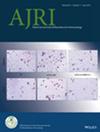Revealing the Complexity of Immunobiological Shifts From Non-Pregnant to Pregnant State
Abstract
Problem
Significant immunological shifts, systemically and at the maternal–fetal interface, are required for successful pregnancy. As immune perturbations are emerging as pivotal drivers of adverse maternal health, elucidating how normal pregnancy alters maternal systemic immunity is imperative.
Methods
From our prospectively enrolled cohort of Black women, peripheral blood samples were collected pre-pregnancy (V1) and in the second trimester (16–24 weeks, V2). Among those who became pregnant, 23 had available samples from both time points. RNA was extracted and subjected to bulk RNA sequencing, followed by differential gene expression analyses, immune cell-type deconvolution, and pathway enrichment analyses. Participants were stratified by pre-pregnancy obesity (body mass index ≥ 30 kg/m2) to examine its impact on pregnancy-induced immune changes.
Results
Pathway analyses revealed innate immune activation and increased neutrophil-driven inflammation during pregnancy. Significant increase in neutrophils and monocytes occurred during pregnancy, whereas naïve CD8+ T-cell and B-cell subsets were significantly decreased. Pre-pregnancy obesity amplified these changes, further increasing innate populations (gamma delta T cells, neutrophils) and decreasing adaptive populations (CD8 naïve T cells, B memory cells).
Conclusion
From individuals with uncomplicated pregnancies, we demonstrate dramatic immunological changes when transitioning from a non-pregnant to pregnant state. Intricate immune modulation, including changes in inflammatory mechanisms and immune cell dynamics were observed. Pre-pregnancy obesity enhances these inflammatory shifts, providing insights into potential mechanisms driving adverse pregnancy outcomes in obese women. Future studies investigating how these immunological shifts are required for optimal maternal health and/or may promote increased vulnerability to adverse pregnancy outcomes will create new opportunities to improve maternal outcomes.

 求助内容:
求助内容: 应助结果提醒方式:
应助结果提醒方式:


